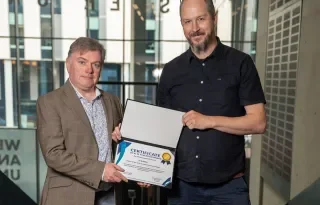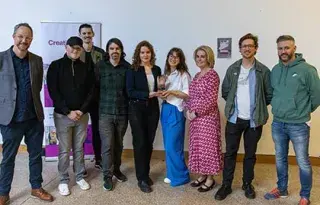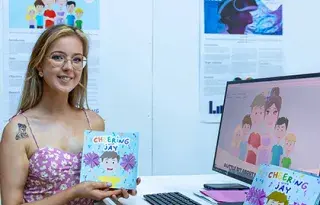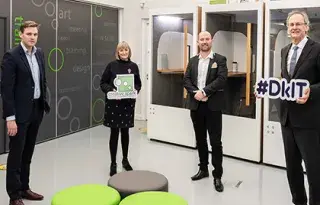BA in Creative Media
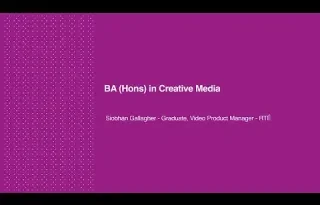
Search to find a different course
Course Overview
This course develops media and communication theory as well as professional and technical skills through lectures, tutorials, studio workshops, exhibitions, presentations and group work. Individual and team-based project work are essential to acquiring the skills to be successful on this course and in industry. This course will build competencies in key skills in both conventional and new media.
Throughout this course students are also challenged to consider design and media production from a variety of cultural perspectives. In Year 3 there is a work placement and a major group project where students work on an interactive media product.
What makes this course different
Blend of Practical and Theory
This course is a blend of practical and theory focused on creative industries with a broad spectrum of disciplines that culminates in a major piece of work.
Work Placement
In Year 3 students undertake a 6 week industry work placement where they gain industry experience and gather contacts within the industry to help them in their future careers.
Communication and Collaboration
There is a strong focus on communication theory and practice as well as developing collaborative skills, both of which are integral for working in the creative industry sector.
Understanding the Industry
Creative Media encompasses a wide range of skillsets across many key creative fields – audio, film, web, and design. Creative media professionals can contribute and collaborate in any creative team environment to create successful and impactful multimedia projects.
It is all about sharing information with others in a unique, effective way, be it with an article, podcast, photograph, graphic, animation, or video. Every company within every industry needs creative content to get their brand, product, and story told. Digital content is one of the most in-demand and evolving mediums in industries such as marketing, advertising, entertainment, and education.
Career Opportunities
Graduates will be equipped to follow career paths in the following broad categories:
- Graphic/Digital Designer
- Web Designer/Front End Developer
- UX Designer
- Digital Marketing
- Marketing/PR
- Audio Designer and Editor
- Video Production and Editor
- Photography
- Motion Designer
- Advertising
- Television & Film
- Any industry where content is needed
Graduates work at
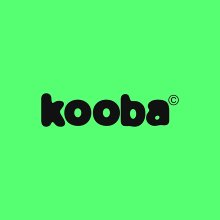
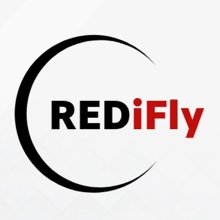

Course Delivery and Modules
Lectures and Tutorials are the most common formats used to deliver modules. Professional and practical skills are developed primarily through studio and workshop practice, exhibitions, presentations and group work. Individual and team-based project work are essential to the acquisition of skills required for success on the course and beyond.
- Media and Communication Studies
- Introduction to Visual Concepts
- 35mm Photography
- Introduction to Web Authoring
- Communication, Research, and Core Study Skills
- Creative Collaborative Development
- Communication Design and Illustration
- Introduction to Sound and Vision
- Storytelling, Creativity, and Interactive Narrative
- Media and Society
- Editorial and Branding Design
- Intermediate Sound and Vision
- Authoring for the Web
- Creative Code for Interactive Applications
- Media Law and Ethics in the Creative Industries
- Design in Motion
- Interactive Sound and Vision
- User Experience (UX) Design
- Group Project Method and Production
Electives:
- Semester Abroad
- Media and Society
- Physical and Pervasive User Experience (UX)
- Design for Creative Advertising and Digital Marketing
- Immersive Technology Concepts
- Creative Media Group Project
- Work Placement for Creative Media
Electives:
- Front-End Web Development
- Advanced Digital Photography
- Narrative Design
- Radio and Podcast Production Concepts
Work placement
In Year 3 students undertake a 6 week industry work placement where they gain important contacts within the industry to help them in their future careers.
Education Progression
On successful completion of this course, students who obtain a GPA of 50 or above as per institute guidelines are eligible to progress to Year 4 of the BA (Hons) in Creative Media.
BA (Hons) in Creative Media
Fees and Funding
Please find information on fees and funding here: www.dkit.ie/fees
Entry requirements
Standard entry requirements apply. There are no special entry requirements for this course.
- Standard Requirements for Leaving Certificate Applicants
- Standard Requirements for UK/NI Applicants
- Standard Requirements for QQI-Further Education Applicants
Technology Requirements:
If a student is purchasing a laptop or home PC we would advise that they consider getting, where possible, the following: a powerful CPU, High RAM (minimum 16GB recommended), a large SSD (minimum 512GB recommended), compatibility with Windows 11 of macOS, Microsoft Office, Wi-Fi capability and a built-in camera for online classes. The device should be capable of running: Adobe Creative Cloud (Premium suite), DaVinci Resolve, Autodesk Maya & Unreal Engine.
Operating System:
- Students on the Creative Media course may choose either Windows or macOS (Apple). Apple devices are available from the HEANET Store.
- Software Subscriptions: Students are advised to purchase an annual subscription to Adobe Creative Cloud (All Apps). Alternatively, they may use other graphic software (e.g., Affinity Suite). Adobe Creative Cloud is available at a discounted rate (€20/month) via the HEANET Store. Please check the HEANET Store for up-to-date pricing.
Recent CAO points
How to apply
Apply on CAO
All standard entry first-year applicants must apply for entry through the CAO. See Important application dates for CAO and information for specific applicant types below:
Advanced Entry & Transfer Applications
Advanced Entry is for applicants who have previous educational achievements and/or work experience and want to be considered for direct entry into year 2, 3, or 4 of a course. This includes students looking to transfer to DkIT from another Higher Education provider.
International Application (non-EU)
International Applicants (not from or living in the EU) can apply through an agent or directly to DkIT to study this course.
Ask us a Question
If you have a question about the BA in Creative Media please ask it below and we will get back to you.
Course News
View all NewsDisclaimer: All module titles are subject to change and for indicative purposes only. All courses are delivered subject to demand and timetables are subject to change. Elective Module options will only run subject to student numbers. The relevant Department will determine the viability of each elective module option proceeding depending on the number of students who choose that option. Students will be offered alternative elective modules on their programme should their preferred elective option not be proceeding. Award Options for Common Entry Programmes: The relevant Department will determine the viability of each award option proceeding depending on the number of students who choose either option. If the numbers for one of the Award options exceed available places, students for this option will be selected based on Academic Merit (highest grades).


